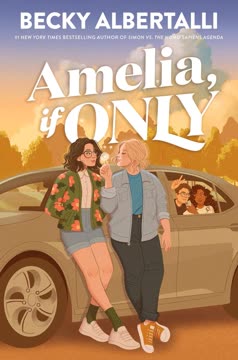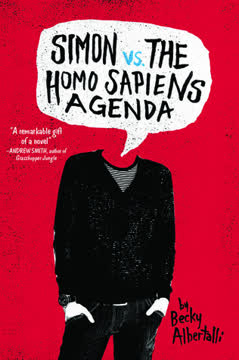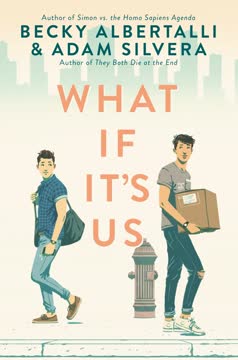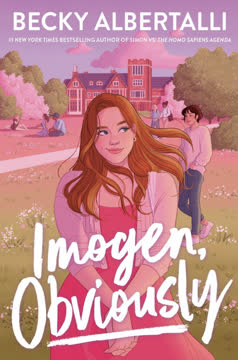Plot Summary
Prom Night, Unraveled Nerves
Amelia is on the edge of her nerves as prom approaches, obsessively checking her phone for a response from her YouTuber crush, Walter Holland, after posting a bold promposal video. Her friends Zora, Mark, and Natalie try to distract her, but the tension is palpable—especially as she navigates the chaos of group photos, her mother's expectations, and the ever-present drama of Natalie's on-again-off-again girlfriend, Claire. Amelia's inner world is a swirl of hope, embarrassment, and the ache of wanting something just out of reach. The night is a collision of fantasy and reality, with Amelia's heart caught between the glitter of prom and the silence from Walter.
Panic Haircuts and Daydreams
In the aftermath of prom, Amelia impulsively cuts her hair, seeking control over her spiraling emotions. The haircut is both a rebellion against her mother's standards and a physical manifestation of her internal chaos. As she faces her family's reactions and her own uncertainty, Amelia's longing for connection—especially with Walter—intensifies. The act of changing her appearance becomes a metaphor for her desire to be seen, to be different, and to escape the confines of her own anxious mind. Daydreams of what could be with Walter mingle with the reality of her friendships and the messiness of growing up.
Parasocial Crushes and Real Friends
Amelia's crush on Walter is more than a typical celebrity obsession; it's a deeply personal, parasocial connection that feels almost real. Her friends, especially Natalie, tease her but also provide grounding support. The group's dynamic is shaped by years of shared history, inside jokes, and the comfort of being known. Yet, Amelia's fixation on Walter highlights the tension between online fantasy and tangible relationships. The boundaries blur as she navigates the complexities of fandom, identity, and the longing for someone who feels both distant and intimately familiar.
The Road Trip Persuasion
After Natalie's latest breakup with Claire, Amelia seizes the opportunity to propose a road trip to upstate New York for Walter's first solo meet-and-greet. Using her persuasive skills—and a strategic bribe of ice cream—she convinces her friends and their parents to embark on the adventure. The trip is framed as a distraction for Natalie, but it's equally about Amelia's hope for something magical to happen with Walter. The journey becomes a rite of passage, a chance to escape, and a test of friendship as they pile into Zora's car, playlists and snacks in tow, chasing the possibility of if-only.
Dandelion Wishes and Queer Longing
At a lakeside amusement park, Amelia and Natalie revisit the tradition of making wishes on dandelions—a ritual that echoes their shared history and unspoken desires. The park's nostalgic atmosphere stirs memories of camp, first crushes, and the slow, confusing process of understanding their own queerness. Amelia reflects on her journey from uncertainty to self-acceptance, the labels that never quite fit, and the comfort of friends who get it. The dandelion becomes a symbol of hope, possibility, and the bittersweet ache of wanting more.
Amusement Park Epiphanies
The group's day at the amusement park is filled with laughter, rides, and playful banter, but beneath the surface, Amelia is unsettled by a growing awareness of her feelings for Natalie. A moment of hand-holding in the haunted funhouse lingers, blurring the line between friendship and something deeper. The park's surreal, timeless quality mirrors Amelia's internal confusion—her longing for clarity, her fear of change, and her hope that wishes might come true. The day ends with rain, arcade games, and a sense that something important is shifting.
Friendship, Flirtation, and Subjunctive Love
As the friends settle in for the night at Zora's aunt's house, the comfort of their long-standing group is both a source of strength and a reminder of impending change. College looms, relationships evolve, and the future feels uncertain. Amelia's banter with Natalie is laced with subtext, their inside jokes taking on new meaning. The concept of a "subjunctive boyfriend"—someone you wish could be yours—captures Amelia's yearning for both Walter and, increasingly, Natalie. The chapter is a meditation on the layers of time, memory, and the ways love can hide in plain sight.
The Meet-and-Greet Dream
The long-awaited meet-and-greet with Walter is a whirlwind of nerves, excitement, and surreal moments. Amelia is starstruck but manages to connect with Walter, who recognizes her from their online interactions. The encounter is both everything she hoped for and a gentle letdown—Walter is kind, genuine, and real, but the fantasy of instant connection dissolves in the face of reality. The experience forces Amelia to confront the limits of parasocial relationships and the importance of the people who are truly present in her life.
Fandom, Shipping, and Online Realities
The story weaves in snippets of online discourse—Reddit threads, Twitter debates, and YouTube comments—highlighting the intensity and absurdity of fandom culture. The shipping wars between "Hayters" and "Waldens," the accusations of queerbaiting, and the hunger for representation all reflect the ways young queer people seek connection and validation online. For Walter and Hayden, the scrutiny is both a source of support and a burden, complicating their friendship and public personas. For Amelia, the online world is a mirror for her own desires and insecurities.
College Futures and Shifting Plans
As the trip winds down, the friends grapple with the reality of impending college and the changes it will bring. Zora reveals she's switching schools to be with her long-distance girlfriend, Edith, upending Amelia's expectations for the future. The group's plans, once so certain, are suddenly in flux. Amelia is forced to reckon with her fear of change, her attachment to the familiar, and the necessity of letting go. The chapter is a bittersweet acknowledgment that growing up means embracing uncertainty and trusting that love can survive distance.
The Truth About Walter and Hayden
In a late-night conversation, Walter confides in Amelia and Mark about the painful end of his friendship with Hayden. The truth is messier than the fandom's theories: ghosting, miscommunication, and the pressures of public scrutiny have left Walter hurt and adrift. The revelation shatters Amelia's illusions about the people she idolizes and underscores the importance of honesty, boundaries, and self-care. Walter's vulnerability is a reminder that everyone, even internet celebrities, is just trying to figure things out.
Confessions, Fights, and Realizations
Tensions come to a head between Amelia and Natalie after the trip. Misunderstandings, jealousy, and unspoken feelings erupt into a fight, with both girls accusing each other of hypocrisy and emotional dishonesty. Natalie leaves abruptly, and Amelia is left reeling, forced to confront her own patterns of avoidance and the depth of her feelings for her best friend. The fight is a crucible, burning away pretense and leaving only the raw truth: love, in all its messy, complicated glory.
The Highway Rescue
When Natalie's bus breaks down on the way home, Amelia, Mark, and Walter stage a rescue, scooping her up from the side of the highway. The journey back is fraught with anxiety, humor, and the realization that sometimes, fate intervenes in unexpected ways. The rescue is both a practical solution and a metaphor for the ways friends show up for each other, even when things are hard. It's a moment of reconnection, forgiveness, and the possibility of starting over.
Camp Kunin and Croissantification
Amelia and Natalie detour to their old summer camp, a place thick with memories and the ghosts of past wishes. Sitting together in the meadow, they finally talk honestly about their feelings, the history of their friendship, and the ways they've always been drawn to each other. The "croissantification" theory—love as layers of memory and experience—becomes their private metaphor for the depth and complexity of their bond. The camp is both a literal and symbolic homecoming, a place where they can finally be honest and vulnerable.
Grand Gestures and New Beginnings
Back in Larchmont, Amelia is confronted by the spectacle of Claire's grand gesture for Natalie. For a moment, it seems like history might repeat itself, but Natalie chooses Amelia, breaking the cycle of old patterns. The friends navigate the awkwardness of change, the thrill of new love, and the bittersweetness of leaving childhood behind. Amelia's family, ever supportive and meddling, provides comic relief and a reminder that love is messy, communal, and worth fighting for.
Kissing, Croissants, and Coming Home
Alone in Natalie's room, the girls confess their feelings and share their first real kiss—a culmination of years of longing, friendship, and near-misses. The moment is tender, electric, and suffused with the weight of everything that came before. Their love is not a grand gesture but a series of small, meaningful moments layered together, like the croissant of time. The chapter is a celebration of queer joy, self-acceptance, and the courage to be seen.
The Bisexual Vehicle
In a moment of levity, Amelia, Mark, and Walter realize they're all bisexual, dubbing themselves the "bi-sketeers." The scene is both funny and profound, a recognition of the power of chosen family and the importance of representation. The friends' identities are affirmed, their bonds strengthened, and the future feels a little less scary. The chapter is a reminder that coming out is not a one-time event but an ongoing process, and that there is joy in finding your people.
Love, Present Tense
The story ends with Amelia and Natalie together, fully present in their love and ready to face whatever comes next. The past is honored, the future is uncertain, but the present is enough. Their relationship is a testament to the power of honesty, vulnerability, and the willingness to risk everything for the chance at something real. The final note is one of hope, joy, and the promise that love—like a croissant—is best when shared, messy, and full of layers.
Characters
Amelia Applebaum
Amelia is the heart of the story—a witty, self-deprecating, and deeply feeling high school senior whose life is shaped by her intense friendships, her Jewish family, and her parasocial crush on YouTuber Walter Holland. Amelia's journey is one of self-discovery, as she navigates the messy terrain of queer identity, first love, and the fear of change. Her impulsive decisions (like the panic haircut and the promposal video) reflect her longing to be seen and her struggle to balance fantasy with reality. Amelia's relationships—with her friends, her family, and herself—are marked by humor, vulnerability, and a relentless hope that if-only can become maybe.
Natalie Rosemann-Long
Natalie is Amelia's best friend since kindergarten, a musician with a dry wit and a gentle spirit. She is the emotional anchor of the group, often the voice of reason amid chaos. Natalie's on-again-off-again relationship with Claire is a source of pain and growth, ultimately leading her to recognize her deeper feelings for Amelia. Her journey is one of learning to advocate for herself, to let go of unhealthy patterns, and to risk vulnerability for the sake of love. Natalie's quiet strength and deep loyalty make her both a grounding force and a source of longing for Amelia.
Zora Winston
Zora is the group's resident brainiac—analytical, calm, and quietly hilarious. As the only non-Jewish member of the friend group, she often feels like an outsider, but her long-distance relationship with Edith provides her with a sense of belonging and purpose. Zora's decision to switch colleges for love is both a bold act of self-assertion and a testament to the power of chosen family. She is the glue that holds the group together, offering perspective, support, and a steady presence amid the emotional storms.
Mark Rosemann-Long
Mark is Natalie's twin brother, known for his deadpan humor, aversion to drama, and surprising emotional depth. He is often the butt of jokes but provides a necessary counterbalance to the group's intensity. Mark's own journey of self-discovery—coming out as bisexual and developing a quiet crush on Walter—mirrors the story's themes of identity and belonging. His understated support and willingness to show up for his friends, even when uncomfortable, make him an essential part of the group's dynamic.
Walter Holland
Walter is the object of Amelia's parasocial affection—a YouTuber whose fame is both a blessing and a burden. Behind the screen, Walter is awkward, kind, and searching for connection. His coming-out journey, complicated friendship with Hayden, and struggles with online scrutiny reveal the human cost of internet fame. Walter's willingness to be vulnerable, to share his story, and to connect with fans like Amelia makes him a symbol of hope and representation for queer youth. His arc is one of self-acceptance, boundary-setting, and the realization that being seen is both terrifying and necessary.
Claire Zimmerman
Claire is Natalie's on-again-off-again girlfriend, a theater kid who refuses to do theater and whose love language is chaos. Her impulsive breakups and grand gestures are both a source of pain and a catalyst for growth in Natalie and Amelia's relationship. Claire embodies the allure and danger of old patterns, forcing the characters to confront what they truly want and deserve. Her presence is disruptive but ultimately necessary for the story's movement toward honesty and new beginnings.
Edith Scott
Edith is Zora's girlfriend, a small-town lesbian with a big heart and a knack for logistics. Their years-long, mostly online relationship is a testament to the endurance of love across distance and difference. Edith's warmth, humor, and organizational skills make her a beloved addition to the group, and her presence at Blackwell College is both a dream come true and a sign of the future's possibilities.
Hayden Geller
Hayden is Walter's former collaborator and best friend, now a rising Hollywood star. His complicated relationship with Walter—marked by ghosting, miscommunication, and the pressures of fame—serves as a cautionary tale about the costs of public life and the fragility of even the closest bonds. Hayden is both idolized and resented by the fandom, and his absence looms large over Walter's journey.
Aunt Jojo
Zora's aunt Jojo is the group's cool adult—artsy, childfree, and endlessly supportive. Her lakeside cottage provides a literal and metaphorical refuge for the friends, a place where they can be themselves, make mistakes, and dream big. Jojo's presence is a reminder that adulthood can be chosen, joyful, and full of possibility.
Audrey Applebaum
Amelia's younger sister, Audrey, is a sharp-tongued, observant eight-year-old who provides both levity and insight. Her commentary on Amelia's love life, her penchant for mischief, and her unexpected wisdom make her a memorable presence. Audrey represents the next generation—curious, open-minded, and unafraid to ask the hard questions.
Plot Devices
Nonlinear Narrative and Digital Interludes
The novel's structure is a tapestry of present-day action, flashbacks, and digital artifacts—Reddit threads, YouTube comments, Twitter debates, and podcast transcripts. This nonlinear approach mirrors the way memory, identity, and fandom operate in the digital age, blurring the boundaries between past and present, online and offline. The interspersed internet content provides both context and commentary, highlighting the impact of online culture on real lives and relationships.
Foreshadowing and Recurring Motifs
The recurring imagery of dandelion wishes, croissants (as a metaphor for layered time and experience), and music (especially Simon & Garfunkel) serves as both foreshadowing and thematic glue. These motifs anchor the characters' emotional journeys, signaling moments of hope, change, and realization. The "croissantification" of love—layered, messy, and cumulative—becomes a central metaphor for the story's approach to romance and friendship.
Meta-Commentary on Fandom and Queer Representation
By weaving in online discourse about shipping, queerbaiting, and representation, the novel reflects on the responsibilities and pitfalls of being both a creator and a consumer in the age of social media. The characters' engagement with fandom is both a source of comfort and a site of conflict, mirroring real-world debates about authenticity, privacy, and the hunger for queer stories.
Parallel Arcs and Mirrored Relationships
The story's central relationships—Amelia and Natalie, Zora and Edith, Walter and Hayden—are constructed as parallel arcs, each grappling with communication, vulnerability, and the fear of change. The mirrored dynamics allow the narrative to explore different facets of love, loss, and self-discovery, emphasizing that every relationship is both unique and universal.
Analysis
"Amelia, If Only" is a love letter to the messy, beautiful process of growing up queer in the internet age. Becky Albertalli crafts a narrative that is both deeply personal and broadly resonant, capturing the anxieties, hopes, and humor of a generation raised on social media, fandom, and the search for representation. The novel's structure—fragmented, nonlinear, and interwoven with digital ephemera—mirrors the way young people experience identity and connection today. At its core, the story is about the courage to risk vulnerability, the necessity of honest communication, and the transformative power of friendship and love. By centering queer joy, self-acceptance, and the importance of chosen family, "Amelia, If Only" offers a hopeful, nuanced vision of what it means to come of age—and come out—in a world that is both more connected and more complicated than ever.
Last updated:
Review Summary
Amelia, If Only received mixed reviews, with an average rating of 3.67 out of 5. Many readers praised Albertalli's portrayal of fandom culture, bisexuality, and parasocial relationships. The book's humor and relatable characters were highlights for some, while others found the writing style chaotic and the romance underdeveloped. Several reviewers appreciated the cameos from characters in Albertalli's previous works. Some felt the book was less compelling than her earlier novels, but many still found it an enjoyable, light-hearted read for fans of queer YA fiction.
Download PDF
Download EPUB
.epub digital book format is ideal for reading ebooks on phones, tablets, and e-readers.








